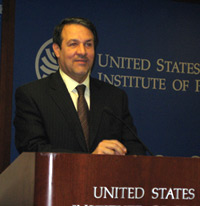Iraq Through Iraqi Eyes
Public event sponsored by USIP and The Middle East Institute
Dr. Al-Dabbagh, official spokesman of the government of Iraq, discussed national reconciliation, the regional situation, and Iranian meddling in Iraq during his talk at USIP. He began by noting that, "Iraqis have shown bravery irrespective of the horrific situation which they have faced over the last three to four years." He emphasized that at present, Iraqis are unified against extremist groups, which pose a threat to all Iraqis, regardless of background. The Iraqis "have to live together," said Al-Dabbagh.
At present, the Iraqi government is striving to allow more than 50,000 former soldiers, who served in the Iraqi army during and prior to the Iraqi invasion, and who subsequently were cut from the force, to rejoin the armed forces. Former soldiers who would have retired can also join the country’s civil service. He also pointed out that Parliament is working to reverse the original impact of the De-Baathification law.

Ali Al-Dabbagh, official spokesman of the government of Iraq.
Al-Dabbagh then moved on to a discussion of the regional situation. Regarding Turkish threats to invade northern Iraq in order to attack the Kurdish PKK group, he emphasized the need for moderation, saying that Iraq treats Turkey as a "very important partner. It’s a gate to Europe."
He also remarked that Iraq and Syria have shown a high level of coordination in moves to thwart extremist attacks, but more steps are needed in this regard.
He commented that Iranian meddling could lead to a disruption of the governmental situation in Iraq. "We feel that still there is a threat of support for militias and some of those who are breaking the law," on the part of Iran, he said. "We want to see that support for Iraq is only for the legitimate elected government."
On Al-Qaeda in Iraq, Al-Dabbagh said that there is a possibility that the group might return to neighboring countries and destabilize the region. In this respect, he called for a high degree of security coordination at an upcoming regional conference in Istanbul.
He emphasized the need for strong ties with Saudi Arabia. "We feel that a high level of coordination, of good relations is to the benefit of the Saudis," remarked Al-Dabbagh.
Al-Dabbagh then fielded a range questions from the audience. Highlights included: the need for more transparency in distributing Iraqi oil; his personal opinion that a referendum to decide the status of Kirkuk (a city in northern Iraq) by 2008 is probably too early; and the sluggish pace of key initiatives, such as the oil distribution law, passing through Iraqi governmental mechanisms. "A lot of rather crucial issues that have to do with the progress of the nation as a whole...are stuck somewhere in the system," he said.
In the discussion, he further warned against extremist groups. "The Shia militias are threatening the Shia areas," Al-Dabbagh observed. Citing Al-Qaeda’s regional reach, he said that, "You cannot leave Iraq in a situation which creates a threat not only to Iraq, but to the region," noting that it has recently been discovered that groups in Lebanon, Algeria, and Morocco have ties to Al-Qaeda in Iraq.
In his last point, Al-Dabbagh elaborated on the prospect of a U.S. withdrawal from the country. "The stability of Iraq is definitely of interest for anyone who is coming to the White House," he noted. Democracy in Iraq, he remarked, is "not an easy job." "Keep in mind we’ve been in tyranny for 35 years. We do need to be patient," Al-Dabbagh emphasized.
Speakers
- Ali Al-Dabbagh
Official Spokesperson for the government of Iraq - Paul Hughes, Moderator
U.S. Institute of Peace
Archived Audio
To listen to audio or to view video, please click on the links provided below. You also can right click on the links and choose "Save Target As" or "Download Linked File." This will save the file to your computer and then allow you to play it in your media player directly. More Audio Help.
- Listen to the audio from this event.
1:12:01 - 13.2MB



